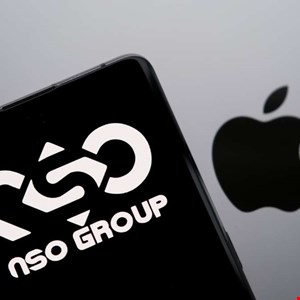Apple to Drop Spyware Lawsuit Over Security Concerns

Read more about the spyware threat:
Apple has filed a motion to drop its lawsuit against Israeli company NSO Group, developer of the Pegasus spyware, citing significant risks to Apple’s threat intelligence program.
Developments in the case has resulted in tech behemoth fearing that sensitive information relating to its cyber defensive measures could be publicly revealed and used by other spyware vendors.
Apple filed a lawsuit against NSO Group and its parent company, Q Cyber Technologies, in November 2021.
The Israeli firm was accused of targeting Apple users with unlawful surveillance technology through its Pegasus spyware. The iPhone maker sought a permanent injunction to ban NSO Group from using any Apple software, services or devices.
Risk to Apple’s Threat Intelligence Program
In its motion to dismiss the lawsuit, Apple mentioned concerns that NSO Group and unidentified Israeli officials may have taken actions to avoid producing information during discovery.
This could mean Apple is required to disclose critical elements of its anti-vulnerability exploit and threat intelligence capabilities to the public.
Other spyware vendors could then use this information to target Apple products and services.
“When it filed this lawsuit nearly three years ago, Apple recognized it would involve sharing information with third parties. However, developments since then have reshaped the risk landscape associated with sharing such information,” noted the US company in its latest filing, published on September 13.
“Because of [these] developments, proceeding forward at this time would now present too significant a risk to Apple’s threat intelligence program.”
Crowded Spyware Landscape Disperses Threats
Apple also said that NSO Group has “been partly supplanted by numerous other spyware companies, dispersing threats that were once concentrated in a single powerful actor.”
The Cupertino-based tech giant believes that even if it wins this lawsuit, other spyware vendors would continue to operate.
A recent report by the Atlantic Council’s Cyber Statecraft Initiative found at least 435 entities across 42 countries involved in spyware development.
An NSO-Group attempt to dismiss the lawsuit on the grounds that the company is “based in Israel and Apple should have sued them there” was ruled out in January 2024 by a US federal judge.
International Efforts Have Weakened Spyware Vendors
Despite its decision to drop charges, Apple said that recent efforts by private companies and national governments to tackle the rise of commercial spyware have “substantially weakened” companies like NSO Group.
Apple made a $10m contribution in 2021 to support cyber surveillance researchers and advocates and was among the signatories of the Pall Mall Process, an agreement signed by 24 nation-states to fight against spyware and human rights abuses in cyberspace.
Meta and Google, also on the list of signatories, have taken action to mitigate spyware threats.
Meta-owned WhatsApp sued NSO Group in 2019, accusing the controversial company of using its messaging service to conduct cyber espionage on journalists, human rights activists, and others.

